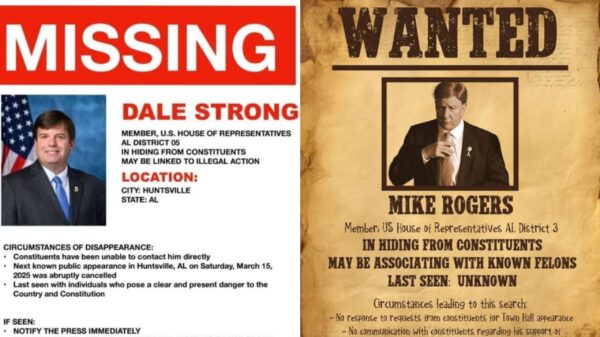By Brandon Moseley
Alabama Political Reporter
On Tuesday, the U.S. Supreme Court issued a landmark ruling in favor of Shelby County in the Shelby County Versus Holder ruling striking down Section 4 of the 1965 Voting Rights Act. Leaders of the Alabama Democratic Party were quick to respond to the ruling.
Congresswoman Terri A. Sewell (D) from Selma said in a written statement, “Today’s Supreme Court ruling is a major setback for voting rights in this country. As a native of Selma and the U.S. Representative who now represents the civil rights district of Alabama, I know that the injustices suffered on the Edmund Pettus Bridge on Bloody Sunday 1965 have not been fully vindicated.”
State Representative Christopher John England said on Facebook, “I don’t know what is more upsetting, the fact that the Supreme Court gutted the Voting Rights Act or that Alabama is responsible for it.”
The Chairman of the Alabama Democratic Majority Judge Mark Kennedy said in a written statement, “I am extremely disappointed in the Supreme Court’s Voting Rights Act decision, and, as Democrats, we will continue to fight for the voting rights of all Alabamians.”
Rep. Sewell said, “Unfortunately, the State of Alabama and this nation still has much work to do. The facts of the Shelby County case prove this very point. It is terribly ironic that the state responsible for the enactment of the Voting Rights Act is now being used by the Supreme Court to dismantle the core of that Act. We cannot rejoice in the failure of our nation’s highest court to uphold voter protections that were so hard fought. By striking down the coverage formula in Section 4 of the Voting Rights Act, the Supreme Court has ostensibly nullified the effects of the preclearance provisions of Section 5 in total disregard of the facts Congress relied upon when it overwhelmingly reauthorized the Act in 2006.”
Rep. England said, “After Congress reauthorized the Voting Rights Act in 2006, a municipality in Shelby County, a party in the landmark case that just gutted the Voting Rights, provided a great example of why we still need its protection. In August 2008, the DOJ objected to a submission seeking preclearance for 177 new annexations and an accompanying redistricting plan for Calera’s City Council. Taken together, the annexations and the redistricting plan would have eliminated the city’s only majority African American district by changing its composition from 70% registered Black voters to just 29.5%. The district had itself been created as the result of a consent decree in prior voting rights litigation. In its submission, Calera admitted that it had adopted the annexations without receiving preclearance. The DOJ objected to both the unprecleared annexations, as well as the accompanying redistricting plan. Notwithstanding this denial, Calera went on to conduct City Council elections both with the annexations and under the rejected plan, causing the city’s sole African American councilmember to lose his seat. The DOJ was then compelled to bring an enforcement action under Section 5 to enjoin certification of the results of the illegal election. After a consent decree was reached with a new precleared plan, the African American district was restored, and Black voters in Calera succeeded in electing their candidate of choice.”
Calera viewed DOJ’s handling of their case as heavy handed resulting in their filing a suit challenging DOJ’s authority and indeed the legality of Section 5 of the Voting Rights Act. Shelby Country agreed with the outraged town and took the case all the way to the Supreme Court resulting in ultimate victory in Tuesday’s ruling.
Chairman Kennedy said in his statement, “What has transpired in the last two years in Alabama is proof that we need the Voting Rights Act. The Republican Supermajority passed a photo ID bill into law in 2011—two years ago. For two years, Republican Attorney General Luther Strange let the bill sit on his desk and refused to send it to the Department of Justice for pre-clearance under Section V of the Voting Rights Act.
Today, on the day that Section V has been for all intents and purposes made null and void, Republican Secretary of State Beth Chapman has made it clear that she’s ready to get to work implementing the photo ID bill when the State of Alabama cannot even provide good data on the number of people the bill will disenfranchise.”
Congresswoman Sewell said, “As we commemorate the 50th anniversary of so many milestones in the Civil Rights Movement, today’s decision reminds us that while we have the right to vote, that right is not without pervasive threats. It is now incumbent upon Congress to act quickly in developing a new coverage formula and I look forward to working with my colleagues on both sides of the aisle in protecting all Americans right to vote.”
It will a challenge for the Congress to rewrite Section 4 of the Voting Rights Act in such a way that it passes the scrutiny of the federal courts and this new ruling and still be passable in both Houses of Congress and acceptable to President Obama.




















































